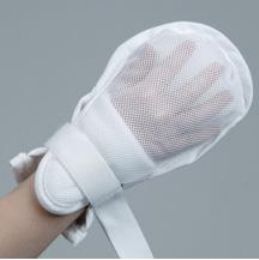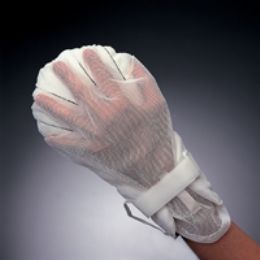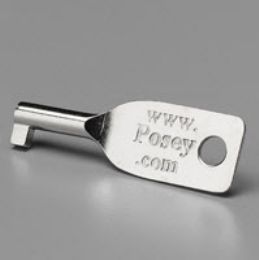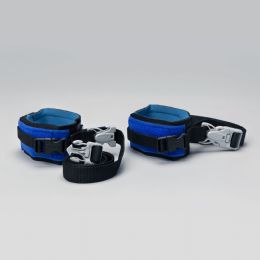












When Are Restraints Used?
Medical settings: During surgical procedures the operating room staff may have to use patient restraints to keep a patient in the proper surgical position, preventing movement or the possibility of falling from the surgical table during surgery. Sometimes patients may need their arms restrained to ensure that they don’t remove tubes and catheters that give them medicine and fluids. Some restless or confused patients may need restraints to prevent them from getting out of bed before recovery, reducing the chance of falling and injury. Restraints are also utilized for patients being transported on stretchers to diminish the risk of falling off the stretcher.
Psychiatric settings: Patient restraints are more commonly used in psychiatric settings to prevent patients from harming themselves or others. The use of patient restraints should be instituted only after verbal de-escalation has been attempted by trained staff. If restraints are employed, the method of restraint should be the least restrictive necessary.
The use of patient restraints should only be done by professionally trained personnel, and may be used without the patient’s consent. The use of restraints by non-professionals can involve legalities concerning the patient’s civil rights, liberties and freedom.
Who Can Legally Use Restraints On Patients?
Medical professionals who have specialized training in using patient restraints can legally apply restraints on a patient without his/her consent in emergency situations. Once a patient is restrained the doctor or other professional medical provider must sign a form to allow the continued restraining use for a specific time. Restraining a patient should be individualized for that patient and employed to maintain physical safety as well as the patient’s dignity and privacy. Once a patient is restrained, periodic monitoring and assessment should be developed as a means in determining if the patient is in need for continuing or discontinuing the restraining order.
Special Care for Restrained Patients
Once a patient is restrained, he or she is usually placed within a seclusion room which allows the patient to calm down in privacy. While in restraints, the staff must be sure that the patient is able to urinate or have a bowel movement when they need to by using either a bedpan or toilet. The patient must also be kept clean, often times needing to be cleaned up after the behavior which caused the restraining. The patient’s clothes need to be rearranged or changed for their comfort and dignity and while restrained, the patient must be allowed to be as comfortable as possible. This may translate to the patient laying on a floor mattress or bed, as this is often the most therapeutic and calming position for a patient in restraints.
If the patient is to be in restraints for a significant period of time, he or she must receive food and fluids when needed. Once a patient is restrained they will need periodical blood flow checks to make sure that the restraints are not cutting off their blood circulation. The methods and types of restraints should be the least restrictive as possible for the protection of the patient, staff and other patients and individuals in the vicinity. Restraining a patient should never be used as a punishment, or to cause harm to the patient. Once it is deemed safe by the medical staff, the patient must be removed from the restraints as soon as possible.
What Are the Different Types of Restraints?
There are different types of patient restraining devices used for different circumstances.
Limb restraints are used to prevent adverse activity with the arms or legs. Usually leather cuffs are placed on the ankles or wrists, with a strap connected to the cuffs that locks down to the side of the bed frame to prevent patents from harming themselves and others. Limb restraints can be a two-point restraint, a four-point restraint or a five-point restraint.
A four-point restraint, when the cuff/belt restraints are placed on each ankle and wrist (four-points) and usually connected to the bed frame, limits patients from moving or flailing around their arms and legs. Two-point restraints are utilized to restrain either the legs or the arms. A five-point restraint is similar to the four-point but with an added waist belt to limit patients from throwing their trunk or body around in a harmful way.
Wheelchair restraints usually consist of a lap belt or a tray that clips/locks across the front of a wheelchair to keep users from falling out of their wheelchair. These are often used with patients who have neurological disorders that can adversely affect their balance and moment. Wheelchair restraints can also be used with elderly patients who suffer from Alzheimer’s or advanced dementia who may want to get up out of the wheelchair, an unwanted activity that may ultimately result in falling or wandering off.
Safety vests or fabric body holders are comfortably worn by a patient like a vest garment. A long strap at each end of the vest can be tied behind a chair or to a bed frame to prevent the patient from getting out of the chair or bed, reducing the risk of serious injury from falling.
Mitten restraints cover the patient’s hands and are usually tied down to a bedframe or chair preventing behaviors inclusive of scratching, grabbing at others or undoing limb restraints.
Straitjackets are devices where a patient is put into an open-back jacket that has long arm sleeves and belts in the back. The patient will have his arms placed into the sleeves and his arms are then placed in a self-hugging position and buckled to the back of the jacket, along with buckles that close the back of the jacket itself. Straightjackets completely bind the patient to prevent harmful movements, and are typically only used as a temporary restraining device for psychiatric emergencies.
Rehabmart is pleased to carry restraint devices from noted vendors that include Posey, McKesson Medical-Surgical, DeRoyal, BSN Medical, Skil-Care and Chattanooga.
Hulet Smith, OT
Rehabmart Co-Founder & CEO
ws